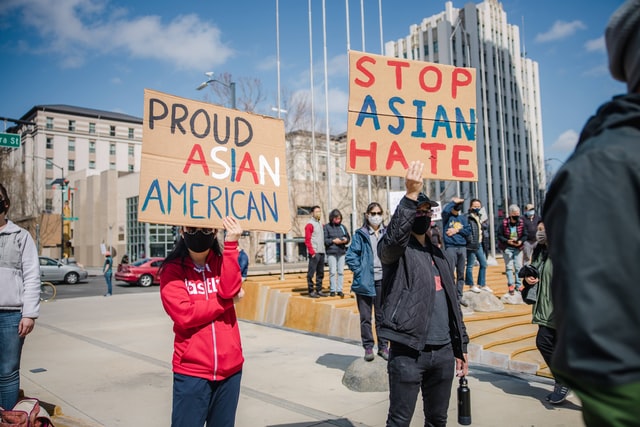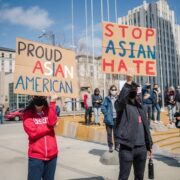
Data shows AAPI elders’ growing concern over racial discrimination amid COVID-19
As hate crimes against APIs increased in 2021, more groups of Asian Americans and Pacific Islanders (AAPI) are reporting that the COVID-19 pandemic has increased fear of racial discrimination.
Since December, a disturbing rise in violence and harassment toward AAPI seniors has punctuated the ongoing anti-Asian hate that percolated across the country since the beginning of the pandemic.
The United States Dept. of Justice this week released its annual Hate Crimes Statistics report for 2020, which found an overall increase in hate crimes with a particular spike in crimes against the AAPI community.
“Last year saw a 6.1% increase in hate crime reports, and in particular, hate crimes motivated by race, ethnicity and ancestry, and by gender identity,” Attorney General Merrick Garland said in a statement on Monday, August 30. “These numbers confirm what we have already seen and heard from communities, advocates and law enforcement agencies around the country. And these numbers do not account for the many hate crimes that go unreported.”
Garland added that the statistics “show a rise in hate crimes committed against members of the Asian American Pacific Islander community.”
But what the DOJ’s report fails to specify is how this rise in anti-AAPI hate affects groups within the vast community, calling to attention the long-awaited need for disaggregated data.
For years, the AAPI community has called for the need for a more sophisticated methodology in research concerning AAPIs, as previously reported in the Asian Journal. On Wednesday, Aug. 25, AARP hosted a panel that addressed anti-Asian hate through recent surveys that affirmed greater efforts to supply more granular data about the community.
“Data is a powerful tool in telling impactful stories. But a persistent lack of data on AAPI communities prevents us from telling the full story,” said Debra Whitman, executive vice president and chief public policy officer for AARP. “Disaggregated data is critical because it gives us insight beyond the general population and helps us understand what’s really happening in every community. AARP is — and has been — committed to including more data on AAPI communities in our research.”
The recent COVID-19 Effects on the Mental Health and Physical Health of Asian Americans & Pacific Islanders Survey Study (COMPASS) found that among AAPIs aged 50 years or older, 3 in 5 (60%) experienced racial discrimination over the past six months.
Moreover, more than half of all AAPIs surveyed (59%) agreed that the U.S. has become more dangerous toward their own ethnic group.
However, Dr. Van Ta Park, professor of UCSF’s Dept. of Community Health Systems who led the study, noted that these findings account only for people who went out in public, and not those who were too afraid to do so.
“We have to interpret these findings with caution because in some ways, in order to experience discrimination, you have to leave your house,” Park shared. “And if you are fearful of leaving your house because of catching COVID or what you see in media or networks about anti-Asian hate, you are then limiting your opportunity for potential discrimination experiences and things that may affect what you think in terms of racial bias.”
Russell Jeung, SFSU professor and co-founder of the Stop AAPI Hate tracker that was established to record reported anti-AAPI incidence during the pandemic, found that fear of racial discrimination is slowly eclipsing the community’s fear of the virus itself.
“Asian Americans are more concerned, more anxious and more fearful of other Americans and their hate than they are about a pandemic that has killed over 600,000 people. Initially, they were worried about the pandemic,” Jeung explained. “Now, they’re more concerned about the violence. You can vaccinate yourself against the pandemic, against COVID-19, but you can’t put on a mask to protect yourself from racism. You can’t get vaccinated against racism. And that’s why our elderly are isolating and then have subsequent mental health impacts.”
The Stop AAPI Hate tracker has recorded more than 9,081 self-reported incidents from March 2020 to June 2021, according to a report released in August. Jeung noted that the most vulnerable groups include seniors (who faced twice as many physical assaults as other AAPI age groups), children and teenagers and women, who are attacked twice as often as men.
Individuals of Chinese descent have reported more hate incidents (43.5%) than all ethnic groups, followed by Koreans (16.8%), Filipinos (9.1%), Japanese (8.6%) and Vietnamese (8.2%).
Anti-Asian misogyny has been a critical issue for the community since the March shootings in Atlanta that took the lives of six Asian women. Those murders motivated a stronger Stop Asian Hate movement that continues to explore the intersections of racism and gender, particularly among AAPI women over the age of 50.
A study called the Voting and Policy Priorities of Asian American and Pacific Islander Women 50 and Older — conducted by the National Asian Pacific American Women’s Forum (NAPAWF) — could that 70% of AAPI women aged 50 and older have been personally impacted by anti-AAPI hate through harassment in the workplace and in public.
AAPI women are at the forefront of the effort to bring forth concrete policy solutions to anti-AAPI harassment and discrimination, which has led to executive orders, mandates and budget proposals at the federal and state levels that specifically address anti-AAPI racism as well as other concerns of AAPI communities.
“We are a powerful voting bloc in American politics that has yet to reach its full potential,” said Drishti Pillai, research manager with NAPAWF. “And contrary to perceived generational differences, older AAPI women are as progressive as their younger counterparts when you consider their voting patterns and beliefs on key issues such as ending racial discrimination and immigration reform.”






